-
01-01-2015
Quality of life and physical activity in intensive care professionals from middle São Francisco
Revista Brasileira de Enfermagem. 2015;68(1):26-31
Abstract
Quality of life and physical activity in intensive care professionals from middle São Francisco
Revista Brasileira de Enfermagem. 2015;68(1):26-31
DOI 10.1590/0034-7167.2015680104i
Views0See moreObjective:
the objective was to assess the level of physical activity (LPA) and the quality of life QL of the professionals who work in ICU.
Method:
this was a cross-sectional study carried out in Adult ICUs. LPA was assessed by the International Questionnarie of Physical Activity – short form (IQPA-SF) and the QL by the Medical Outcomes Study 36 (SF-36) questionnaire.
Results:
it was classified active 50.89% out of a total of 59 professionals. Nursing technicians were considered the most active with 60.6%. The QL of the professionals who were considered active were better when compared to inactives, with statistical differences to the category of physical aspects limitation, social aspects and mental health. The working hours were higher than recommend, the physicians were higher than the physical therapist, nurses and technicians nurses (p = 0.046).
Conclusion:
physically active professionals who work in ICU had higher quality of life probably why have lower hours of work and consequently more free time to engage in physical activity.

-
01-01-2015
Learning needs of Nursing students in technical vocational education
Revista Brasileira de Enfermagem. 2015;68(1):20-25
Abstract
Learning needs of Nursing students in technical vocational education
Revista Brasileira de Enfermagem. 2015;68(1):20-25
DOI 10.1590/0034-7167.2015680103i
Views0See moreObjective:
identify learning needs of students of Technical Vocational Education (TVE) in Nursing. Qualitative study conducted in a city of São Paulo state.
Method:
the subjects were students, teachers and coordinators of TVE and students of the bachelor degree who have had contact with TVE. Data collection was performed by questionnaire socioeconomic and cultural circles about the learning needs. For data analysis we used the content analysis.
Results:
it was found that students have difficulties contents not related to nursing as portuguese and mathematics, as well as introductory courses in the course of TVE which possibly may interfere negatively in learning specific content of nursing and the quality of health care.
Conclusion:
it is necessary to rethink the content taught and ways to teach from basic education, as well as the training of teachers who now works in the TVE.
-
01-01-2015
Serious game e-Baby: nursing students’ perception on learning about preterm newborn clinical assessment
Revista Brasileira de Enfermagem. 2015;68(1):13-19
Abstract
Serious game e-Baby: nursing students’ perception on learning about preterm newborn clinical assessment
Revista Brasileira de Enfermagem. 2015;68(1):13-19
DOI 10.1590/0034-7167.2015680102i
Views0See moreObjective:
to evaluate students opinion regarding e-Baby educational technology.
Methodology:
exploratory descriptive study in which participated a sample composed of 14 nursing Portuguese students that used e-Baby digital educational technology in an extracurricular course. To achieve the aim of the study, the data collection was realized through an opinion instrument in Likert scale including the possibility of commentaries by students. Is was also collected data of participants’ characterization.
Results:
students made very satisfactory evaluations regarding the game e-Baby, varying since usability acceptation through suggestions of expansion of the game to other nursing themes.
Conclusion:
serious game e-Baby can be considered a didactic innovation and motivator tool of learning. Besides, it demonstrates have adequate interface in design and educative function aspects, evocating intense interaction between user and computational tool.

-
01-01-2015
Challenges beyond the scientific knowledge production
Revista Brasileira de Enfermagem. 2015;68(1):7-8
Abstract
Challenges beyond the scientific knowledge production
Revista Brasileira de Enfermagem. 2015;68(1):7-8
DOI 10.1590/0034-7167.2015680101p
Views0For several decades, innumerous appeals and reflections on how to build the nursing science and achieve visibility in the scientific world led researchers to make efforts to produce knowledge that contributed to the well-being of people, improving their quality of life, relieving their suffering and transforming the reality in which we live. In addition to […]See more
-
REVIEW05-03-2024
Elements of fatherhood involved in the gestational period: a scoping review
Revista Brasileira de Enfermagem. 2024;77(1):e20230029
Abstract
REVIEWElements of fatherhood involved in the gestational period: a scoping review
Revista Brasileira de Enfermagem. 2024;77(1):e20230029
DOI 10.1590/0034-7167-2023-0029
Views0See moreABSTRACT
Objective:
To identify in the literature and summarize the elements and characteristics of fatherhood involved during pregnancy.
Method:
Scoping review that used PRISMA-ScR guide to report this review. Searches were carried out in PubMed, CINAHL, PsycInfo, LILACS and Scopus. Google search engines and public health agency websites assisted in searches of gray literature and Rayyan in screening studies.
Results:
A total of 406 articles were identified, of which 16 made up the final sample. Five elements make up an involved fatherhood: feeling like a father, being a provider and protector, being a partner and participant in pregnancy, participating in prenatal appointments and feeling prepared to take care of a baby.
Conclusion:
Fathers want to be involved in prenatal care, but feel excluded from this process. Public policies that encourage paternal involvement and healthcare professional training to better welcome and promote paternal involvement are of paramount importance.
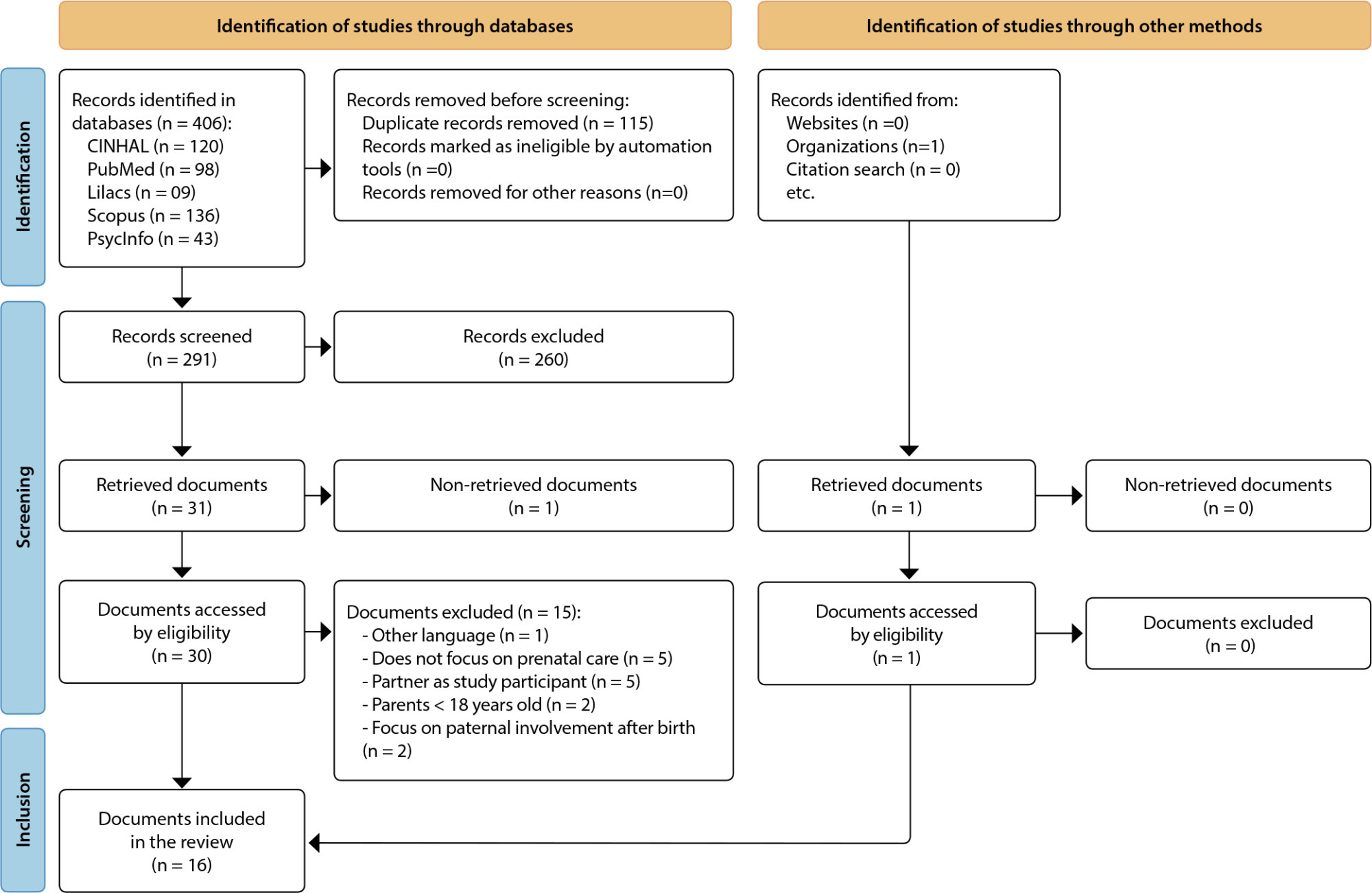
-
05-03-2024
Preditores de volume excessivo de líquidos em pacientes em hemodiálise: estudo observacional
Revista Brasileira de Enfermagem. 2024;77(1):e20220816
Abstract
Preditores de volume excessivo de líquidos em pacientes em hemodiálise: estudo observacional
Revista Brasileira de Enfermagem. 2024;77(1):e20220816
DOI 10.1590/0034-7167-2022-0816
Views0See moreRESUMEN
Objetivos:
evaluar los factores de riesgo del exceso de volumen de líquido en pacientes en hemodiálisis.
Métodos:
estudio retrospectivo de casos y controles. Se incluyeron 392 pacientes (196 casos y 196 controles) de dos centros de hemodiálisis. Se evaluaron datos sociodemográficos y 23 factores de riesgo de exceso de volumen de líquido mediante un formulario de recolección de datos. Los datos se analizaron mediante un modelo de regresión logística multivariado.
Resultados:
factores de riesgo conocimiento insuficiente (OR=2,06), ingesta excesiva de líquidos (OR=2,33), retirada inadecuada de líquidos durante la hemodiálisis (OR=2,62) e ingesta excesiva de sodio (OR=1,91) pueden aumentar aproximadamente dos veces la posibilidad de que se produzca un exceso de volumen de líquido en pacientes en hemodiálisis. La educación (OR=0,95) y la edad (OR=0,97) son factores protectores del volumen excesivo de líquido.
Conclusiones:
conocer estos factores de riesgo puede ayudar a las enfermeras a realizar una inferencia diagnóstica precisa y rápida del riesgo de volumen excesivo de líquidos.
-
ORIGINAL ARTICLE05-03-2024
Predictors of excess fluid volume in hemodialysis patients: an observational study
Revista Brasileira de Enfermagem. 2024;77(1):e20220816
Abstract
ORIGINAL ARTICLEPredictors of excess fluid volume in hemodialysis patients: an observational study
Revista Brasileira de Enfermagem. 2024;77(1):e20220816
DOI 10.1590/0034-7167-2022-0816
Views0See moreABSTRACT
Objectives:
to assess risk factors for excess fluid volume in hemodialysis patients.
Methods:
a retrospective case-control study was conducted. A total of 392 patients (196 cases and 196 controls) from two hemodialysis centers were included. Sociodemographic data and 23 risk factors for excess fluid volume were assessed using a data collection form. Data were analyzed using a multivariate logistic regression model.
Results:
the insufficient knowledge (OR=2.06), excessive fluid intake (OR=2.33), inadequate fluid removal during hemodialysis (OR=2.62) and excessive sodium intake (OR=1.91) risk factors may increase the chance of occurrence of excess fluid volume in hemodialysis patients by approximately two times. Education level (OR=0.95) and age (OR=0.97) are protective factors for excessive fluid volume.
Conclusions:
knowing these risk factors may help nurses with accurate and rapid diagnostic inference of the risk of excessive fluid volume.
-
ORIGINAL ARTICLE05-03-2024
What is the burden of multimorbidity and the factors associated with its occurrence in elderly Brazilians?
Revista Brasileira de Enfermagem. 2024;77(1):e20220809
Abstract
ORIGINAL ARTICLEWhat is the burden of multimorbidity and the factors associated with its occurrence in elderly Brazilians?
Revista Brasileira de Enfermagem. 2024;77(1):e20220809
DOI 10.1590/0034-7167-2022-0809
Views0See moreABSTRACT
Objective:
To estimate the prevalence of multimorbidity in elderly people and its association with sociodemographic characteristics, lifestyle, and anthropometry.
Methods:
This was a cross-sectional study using data from the National Health Survey, 2019. A total of 22,728 elderly individuals from all 27 Brazilian states were randomly selected. Poisson regression models with robust variance were employed, and a significance level of 5% was adopted.
Results:
The prevalence of multimorbidity was 51.6% (95% CI: 50.4-52.7), with the highest estimates observed in the South and Southeast. Multimorbidity was associated with being female (aPR = 1.33; 95% CI: 1.27-1.39), being 80 years old or older (aPR = 1.12; 95% CI: 1.05-1.19), having low education (aPR = 1.16; 95% CI: 1.07-1.25), past cigarette use (aPR = 1.16; 95% CI: 1.11-1.21), insufficient physical activity (aPR = 1.13; 95% CI: 1.06-1.21), and screen use for 3 hours or more per day (aPR = 1.13; 95% CI: 1.08-1.18).
Conclusion:
Multimorbidity affects more than half of the elderly population in Brazil and is associated with social, demographic, and behavioral factors.

-
ORIGINAL ARTICLE04-22-2024
Nurses’ perception of the nursing process and its relationship with leadership
Revista Brasileira de Enfermagem. 2024;77(1):e20230371
Abstract
ORIGINAL ARTICLENurses’ perception of the nursing process and its relationship with leadership
Revista Brasileira de Enfermagem. 2024;77(1):e20230371
DOI 10.1590/0034-7167-2023-0371
Views0See moreABSTRACT
Objectives:
to describe Nurses’ perception of the Nursing Process and its relationship with leadership.
Methods:
action research conducted between September/2021 and April/2022 with nurses from a medium-sized hospital in southern Brazil. The data investigated, one of the stages of the method, was collected using the Focus Group technique and submitted to Strategic Focus Analysis.
Results:
three categories emerged from the organized and analyzed data, namely: Nursing Process: a tool that qualifies nursing care; Conditions that weaken the Nursing Process; and Strategies that enhance the Systematization of Nursing Care.
Final Considerations:
the perception of the Nursing Process and its relationship with leadership are not always understood as complementary themes. Although they recognize that the Nursing Process is sometimes imposed as normative, nurses do not perceive the importance of the role of the leader, who is considered a key player in conducting and boosting the Systematization of Nursing Care.

-
ORIGINAL ARTICLE04-22-2024
Adherence to Covid-19 vaccination during the pandemic: the influence of fake news
Revista Brasileira de Enfermagem. 2024;77(1):e20230284
Abstract
ORIGINAL ARTICLEAdherence to Covid-19 vaccination during the pandemic: the influence of fake news
Revista Brasileira de Enfermagem. 2024;77(1):e20230284
DOI 10.1590/0034-7167-2023-0284
Views0See moreABSTRACT
Objectives:
to understand how fake news has influenced adherence to Covid-19 immunization, from the perspective of health professionals.
Methods:
a qualitative, descriptive-exploratory study was conducted in Campo Grande – MS. Twenty nursing professionals working in vaccine rooms or managing immunobiologicals participated through semi-structured interviews. The interviews were audio-recorded, fully transcribed, and subjected to thematic content analysis.
Results:
two categories emerged in which the professionals highlighted an increase in vaccine hesitancy among the population, influenced by fake news and denialist actions, which negatively interfered with the population’s trust in vaccines and in the professionals administering them.
Final Considerations:
concerns about vaccine safety and denialist actions by authorities and media outlets can contribute to the phenomenon of non-vaccination. The valorization of science, the promotion of educational actions, and raising public awareness about immunization were presented as strategies to increase vaccine coverage
-
ORIGINAL ARTICLE04-22-2024
Mothers’ perception of the care of newborn in the home environment
Revista Brasileira de Enfermagem. 2024;77(1):e20230080
Abstract
ORIGINAL ARTICLEMothers’ perception of the care of newborn in the home environment
Revista Brasileira de Enfermagem. 2024;77(1):e20230080
DOI 10.1590/0034-7167-2023-0080
Views0See moreABSTRACT
Objectives:
to identify mothers’ perceptions about caring for newborns in the home environment, from the perspective of complexity thinking.
Methods:
qualitative, exploratory and descriptive research, carried out between November/2022 and February/2023. Data were collected through individual interviews with 21 mothers from southern Brazil who cared for newborns at home and analyzed using the thematic analysis technique.
Results:
the four thematic axes resulting from the data analysis: Living amidst order and disorder; embracing singularities; dealing with the certain and the uncertain; support network in the (re)organizing process demonstrate that the mother caring for a newborn in their home environment experiences a distinct and plural adaptive process, which must be welcomed and understood by health professionals who work within the family environment.
Final Considerations:
the care of newborns in a home environment, in the perception of mothers, requires differentiated attention and a formal or informal support network that considers the unique specificities of each woman/mother in the personal, family and social spheres. Therefore, in addition to the social support network, it is important to rethink home intervention approaches.
-
ORIGINAL ARTICLE04-22-2024
Learning difficulties in school children: health and education professionals’ perceptions
Revista Brasileira de Enfermagem. 2024;77(1):e20230074
Abstract
ORIGINAL ARTICLELearning difficulties in school children: health and education professionals’ perceptions
Revista Brasileira de Enfermagem. 2024;77(1):e20230074
DOI 10.1590/0034-7167-2023-0074
Views0See moreABSTRACT
Objectives:
to understand health and education professionals’ perceptions regarding children’s learning difficulties in public schools.
Methods:
qualitative research, of the participatory action type, linked to Paulo Freire’s Research Itinerary. Forty-five professionals participated, through interviews and a Virtual Culture Circle. The analysis was developed through careful reading, reflection and interpretation of highlighted topics.
Results:
professionals discussed the (in)visibility of learning difficulties, strategies and resources in the educational sector and the search for solutions in the health sector. It was found that the production of complaints related to school learning is attributed predominantly as an individual problem of children or their family, exempting the educational institution from this process.
Final Considerations:
greater investment in professional training and development policies is urgently needed to facilitate coordination between sectors, with a view to overcoming outdated pedagogical and health models.
-
ORIGINAL ARTICLE11-28-2023
Development and validity of an educational folder for pulmonary tuberculosis sputum collection
Revista Brasileira de Enfermagem. 2023;76(1):e20220194
Abstract
ORIGINAL ARTICLEDevelopment and validity of an educational folder for pulmonary tuberculosis sputum collection
Revista Brasileira de Enfermagem. 2023;76(1):e20220194
DOI 10.1590/0034-7167-2022-0194
Views0See moreABSTRACT
Objective:
to develop and validate an educational folder for pulmonary tuberculosis sputum collection.
Method:
a methodological study, developed in four phases: project design, bibliographic survey, development, and content and appearance validity. For validity, the Content Validity Index greater than or equal to 0.80, the Kappa Coefficient and the Suitability Assessment of Materials were adopted.
Results:
an educational folder was developed containing the recommended steps for quality sputum collection. It was validated by 19 expert judges in the first validity cycle, obtaining an overall Content Validity Index of 0.90, perfect agreement among judges, with a total Kappa of 0.83 and superior suitability.
Conclusion:
the material is valid, as it contains suitable, simple and attractive language, illustrations and layout, indicating perfect agreement and reliability. Thus, it has the potential to assist in carrying out the recommended steps for correct sputum collection and enable the correct diagnosis.
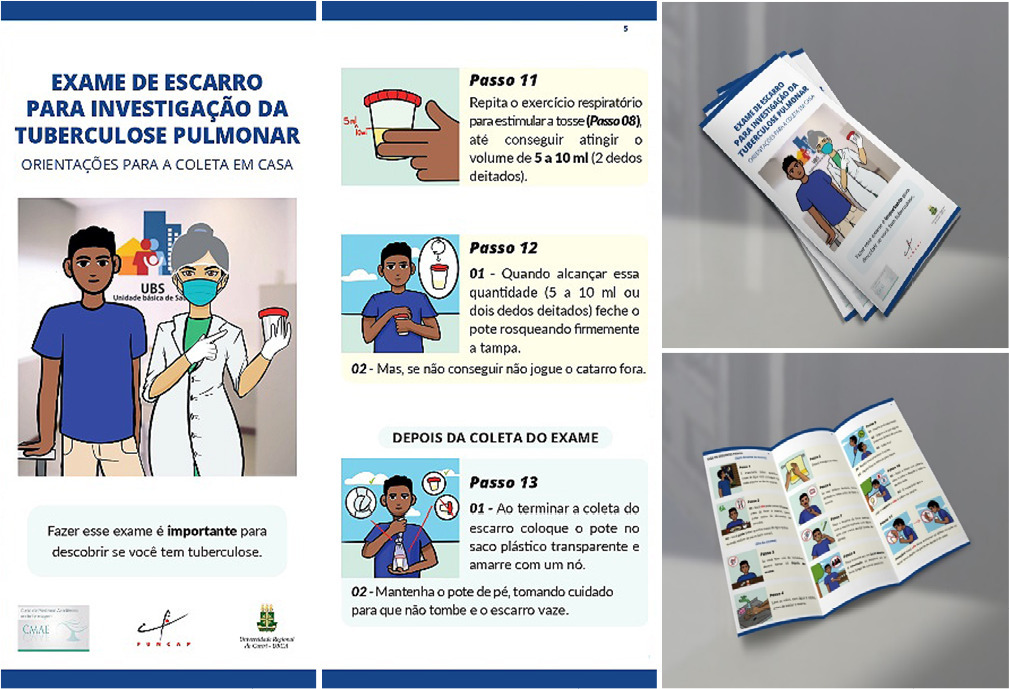
-
REVIEW11-28-2023
Contributions of the institutions for the nursing professionalization: integrative review (2010-2020) in the light of freidsonian conceptions
Revista Brasileira de Enfermagem. 2023;76(1):e20220153
Abstract
REVIEWContributions of the institutions for the nursing professionalization: integrative review (2010-2020) in the light of freidsonian conceptions
Revista Brasileira de Enfermagem. 2023;76(1):e20220153
DOI 10.1590/0034-7167-2022-0153
Views0See moreABSTRACT
Objective:
To analyze the contributions of the Brazilian Nursing Association and the Federal and Regional Nursing Councils in the literature for the professionalization of nursing in the light of Eliot Freidson’s theoretical conceptions.
Methods:
Integrative review of the literature, of socio-professional historical interest, carried out from June to November 2021, through the question: How did professional associations contribute to the professionalization of Brazilian nursing according to the literature from 2010 to 2020? The evidence were organized in a synoptic table, which allowed the construction of a conceptual map.
Results:
In the 23 selected studies, the professional associations presented scientific, social and political contributions, which shape the professional field of nursing, enabling knowledge/expertise, autonomy and self-regulation.
Final considerations:
The efforts of these institutions reaffirm nursing as an academic and consulting profession, capable of exerting control over the essence of nursing work. They strive to consolidate nursing as a legitimate professional field of health in Brazil.
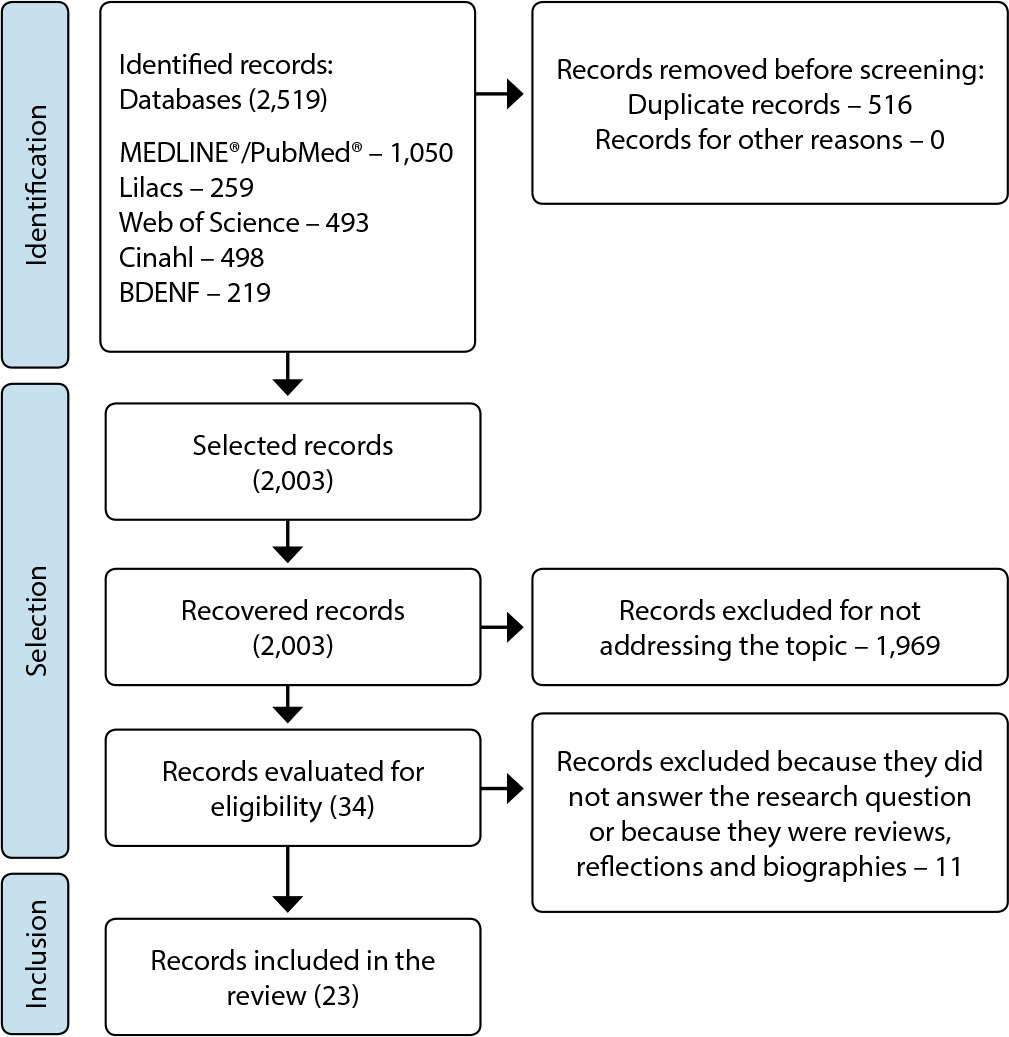
-
REVIEW11-28-2023
Simulated scenarios in nursing: an integrative literature review
Revista Brasileira de Enfermagem. 2023;76(1):e20220123
Abstract
REVIEWSimulated scenarios in nursing: an integrative literature review
Revista Brasileira de Enfermagem. 2023;76(1):e20220123
DOI 10.1590/0034-7167-2022-0123
Views0See moreABSTRACT
Objectives:
to identify in scientific literature which simulated clinical scenarios were developed and validated for teaching and learning in nursing.
Methods:
integrative review, carried out in seven sources of information. The Rayyan program was used for selection, content analysis to explore the findings and the methodological assessment tool of the validity process, entitled Quality Appraisal tool for Validity Studies.
Results:
initially, 1,179 manuscripts were identified and 14 were part of the sample. Two categories were defined: Profile of simulated clinical scenarios produced in nursing; and Clinical skills developed and their assessment mechanisms.
Final Considerations:
there was a preponderance of high-fidelity scenarios, built in Brazil in the last five years, aimed at nursing students on the themes of emergency, maternal care and stomatherapy, addressing the assessment of cognitive, psychomotor and affective skills in nursing. Most studies obtained good methodological quality in their content validity process.
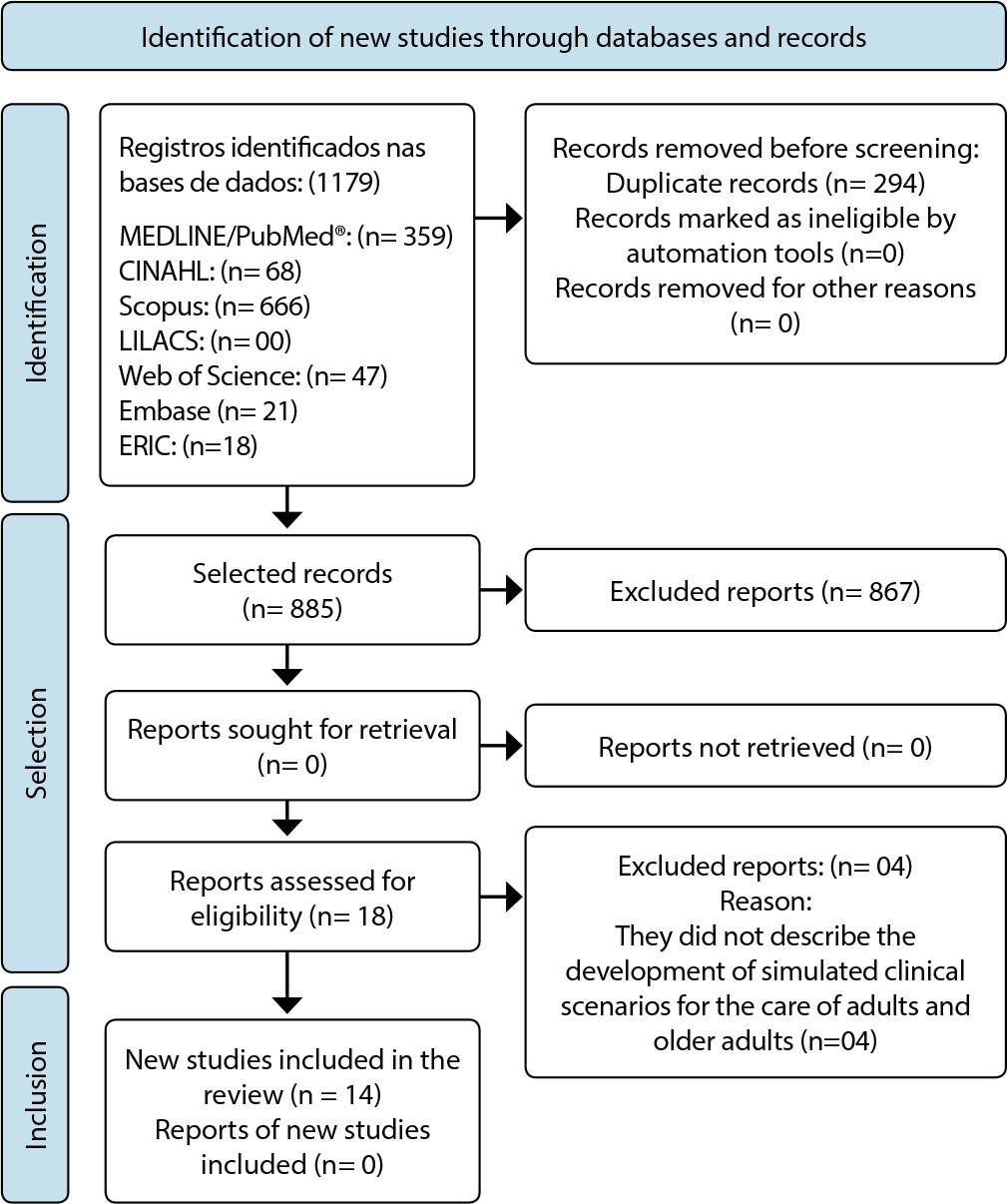
-
ORIGINAL ARTICLE11-28-2023
Factors associated with psychopathological symptoms among nurses at a university hospital
Revista Brasileira de Enfermagem. 2023;76(1):e20220075
Abstract
ORIGINAL ARTICLEFactors associated with psychopathological symptoms among nurses at a university hospital
Revista Brasileira de Enfermagem. 2023;76(1):e20220075
DOI 10.1590/0034-7167-2022-0075
Views0See moreABSTRACT
Objectives:
to analyze the factors associated with psychopathological symptoms among nurses at a university hospital.
Methods:
a cross-sectional study developed at a university hospital in Pernambuco, in which 90 nurses participated. A questionnaire with social and professional characteristics and the Symptom Assessment Scale were used.
Results:
an association was found between the variable changing profession and the presence of characteristic symptoms of psychoticism, somatization and anxiety among nurses.
Conclusions:
the emergence of psychopathological symptoms has influenced nurses’ desire to search for another profession. This evidence reinforces the need for greater investments in better working conditions and welcoming actions in the work environment, in order to provide a better quality of professional life and promote the health of these workers.
-
ORIGINAL ARTICLE11-28-2023
Nursing protocol in chronic kidney disease prevention in older adults in primary care
Revista Brasileira de Enfermagem. 2023;76(1):e20220052
Abstract
ORIGINAL ARTICLENursing protocol in chronic kidney disease prevention in older adults in primary care
Revista Brasileira de Enfermagem. 2023;76(1):e20220052
DOI 10.1590/0034-7167-2022-0052
Views0See moreASBTRACT
Objectives:
to develop a protocol for Nursing Process operationalization in approaching older adults with vulnerability to chronic kidney disease in Primary Health Care, based on Neuman’s stressors.
Methods:
a methodological study, carried out in two stages: 1) synthesis of evidence using an inductive strategy (mixed method study) and 2) protocol development to support the nursing process operationalization with older adults enrolled in a Basic Health Unit, using a deductive strategy (Neuman’s stressor concepts, NANDA, NIC, and NOC taxonomies, Risner’s line of reasoning, and cross-mapping), described according to A Step-by-Step Guide to Developing Protocols.
Results:
102 older adults participated, and 17 diagnoses, 34 interventions and 26 nursing outcomes were identified.
Conclusions:
the protocol developed is a technology that makes it possible to operationalize the Nursing Process, based on Neuman’s stressors and on taxonomy, conceptual and care frameworks, guiding care and nursing records.
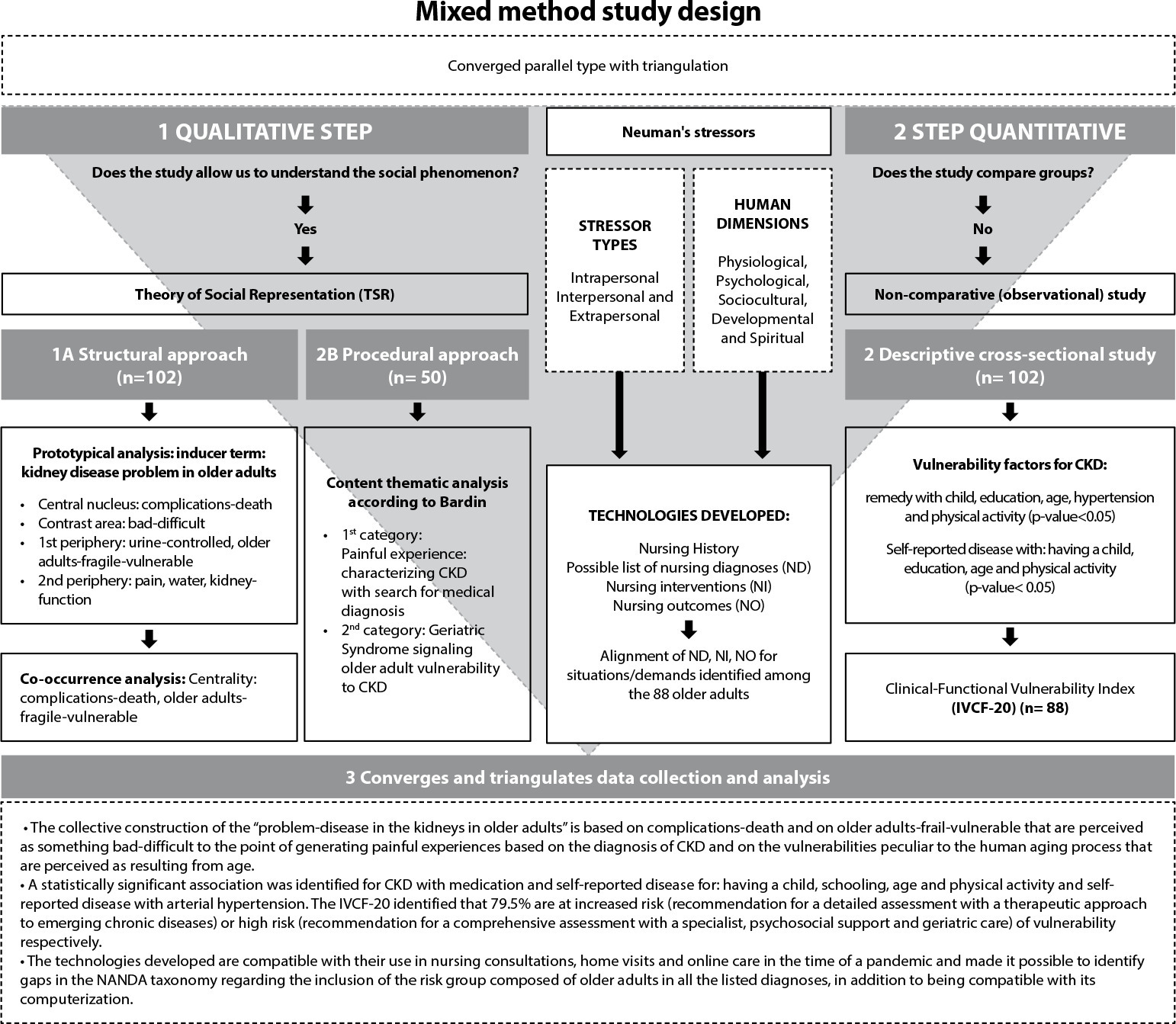
-
ORIGINAL ARTICLE11-28-2023
Handgrip strength in older adults and driving aptitude
Revista Brasileira de Enfermagem. 2023;76(1):e20210729
Abstract
ORIGINAL ARTICLEHandgrip strength in older adults and driving aptitude
Revista Brasileira de Enfermagem. 2023;76(1):e20210729
DOI 10.1590/0034-7167-2021-0729
Views0See moreABSTRACT
Objective:
to analyze handgrip strength as a predictor of the inability to drive in older adults.
Method:
a cross-sectional study conducted in traffic clinics with 421 older adults in Curitiba-Paraná from January 2015 to December 2018. A sociodemographic and clinical questionnaire, handgrip strength test, and queries from the National Registry of Qualified Drivers form were applied.
Results:
Reduced handgrip strength was not a predictor of inaptitude for vehicular driving (p=0.649). The predictors of inaptitude were: low education (p=0.011), incomplete elementary education (p=0.027), and cognition (p=0.020).
Conclusion:
reduced handgrip strength was not shown to predict for loss of driving skills in older adults. Low education level and reduced cognition level are conditions that were shown to be predictors for loss of vehicular driving license.
-
ORIGINAL ARTICLE11-28-2023
The Chronic Care Model and its implications for Specialized Outpatient Care
Revista Brasileira de Enfermagem. 2023;76(1):e20210315
Abstract
ORIGINAL ARTICLEThe Chronic Care Model and its implications for Specialized Outpatient Care
Revista Brasileira de Enfermagem. 2023;76(1):e20210315
DOI 10.1590/0034-7167-2021-0315
Views0See moreABSTRACT
Objective:
to assess the Chronic Care Model implementation in Specialized Outpatient Care and its repercussions for health care.
Methods:
qualitative evaluative research, conducted by the Chronic Care Model. We used observation techniques, document analysis and interviews with 21 health professionals from specialized care. Analysis was conducted by triangulation, with the aid of MAXQDA software for initial and focused coding. All ethical aspects were respected.
Results:
professionals recognized that the model reorganized service care and administrative practices, presenting positive repercussions for the health of people assisted. The absence of continuing education for service professionals compromised the complete model implementation.
Final considerations:
the implementation, even if partial, of the model brings contributions to service improvement. The weaknesses that are still present are compatible with professionals’ difficulty in distancing themselves from the biomedical model.

-
11-25-2022
Reflexões sobre a ciência em enfermagem gerontológica: possibilidades para o seu caminhar
Revista Brasileira de Enfermagem. 2022;75:e75Suppl401
Abstract
Reflexões sobre a ciência em enfermagem gerontológica: possibilidades para o seu caminhar
Revista Brasileira de Enfermagem. 2022;75:e75Suppl401
DOI 10.1590/0034-7167.202275Suppl401pt
Views0O conhecimento científico em enfermagem gerontológica brasileiro tem seus primórdios há mais de 50 anos, especificamente em meados de 1970, alinhados ao movimento mundial de reconhecimento da complexidade do envelhecimento populacional e dos seus desafios na esfera social, cultural, política e de saúde pública. Desde então, a produção científica nesse campo guarda relação com a […]See more
Search
Search in:
Nuvem de Tags
Adolescente (85) Atenção Primária à Saúde (239) COVID-19 (91) Criança (91) Cuidados de Enfermagem (269) Educação em Enfermagem (151) Educação em Saúde (139) Enfermagem (930) Enfermagem Pediátrica (86) Estudantes de Enfermagem (77) Estudos de Validação (131) Família (87) Idoso (208) Promoção da Saúde (99) Qualidade de Vida (104) Saúde do Trabalhador (86) Saúde Mental (145) Saúde Pública (82) Segurança do Paciente (150) Tecnologia Educacional (100)



